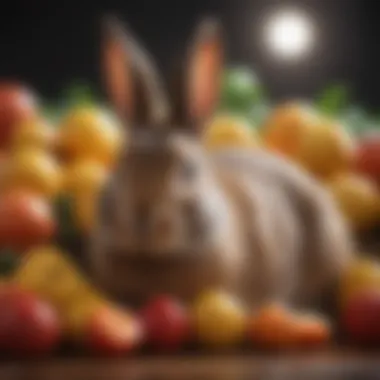Safe Foods for Bunnies: Essential Dietary Choices


Intro
Understanding the dietary needs of rabbits is essential for any pet owner who wishes to provide a healthy and fulfilling life for their furry friend. This guide presents a deep dive into safe foods for bunnies, emphasizing their nutritional requirements, correct feeding practices, and potential hazards involved in unsuitable dietary choices. Through this comprehensive analysis, pet owners will gain valuable insights into the best practices for feeding their rabbits, ensuring their nutritional needs are met.
Understanding Your Pet
Bunnies are social creatures that thrive in environments where their natural behaviors can be expressed. It is crucial for pet owners to recognize the specific requirements of rabbits, including their dietary needs, to maintain their overall health and happiness.
Pet Behavior Basics
Rabbits exhibit fascinating behaviors that reflect their instincts. They are prey animals by nature, which manifests in their need for safety and comfort. Recognizing signs of stress or discomfort in your bunny is crucial. Provide a calm environment with plenty of spaces to hide and explore. These natural behaviors must be taken into account when establishing routines around feeding and care.
Common Breed Characteristics
Each rabbit breed has unique traits that can influence dietary needs. For instance, larger breeds such as Flemish Giants may require different feeding quantities compared to smaller breeds like Netherland Dwarfs. Understanding these differences can help rabbits maintain optimal weight and health.
Species-Specific Needs
Rabbit species have specific dietary requirements that should be considered. They are obligate herbivores, meaning their diet should primarily consist of hay, fresh vegetables, and limited fruits. The necessary fiber content helps with digestion, which is vital for their well-being. Pet owners must strive to provide a balanced diet aligned with these species-specific needs.
Pet Care and Maintenance
Caring for a rabbit goes beyond just food. It includes various aspects of maintenance that contribute to a healthy and happy life for bunnies.
Feeding Guidelines
A proper feeding regimen is key. Rabbits should primarily consume unlimited quality grass hay, such as Timothy hay, which offers necessary fiber. Additionally, fresh greens like romaine lettuce, cilantro, and parsley can be introduced slowly. It is important to avoid high-sugar or high-starch foods, such as iceberg lettuce or carrots, as they can upset the bunny's digestive system.
Grooming Essentials
Routine grooming cannot be overlooked. While rabbits do groom themselves, they may require assistance during shedding periods. Regular brushing can reduce loose fur and prevent hairballs. Take care of their nails too, trimming them as needed to avoid discomfort.
Hygiene Practices
Maintaining cleanliness is important. Keep living areas clean by regularly changing bedding and removing waste. This will not only help in keeping your bunny healthy but also ensure a pleasant environment for both pet and owner. Regular cleaning habits foster a good pet-care routine.
Health and Wellness
Keeping bunnies healthy requires proactive measures.
Routine Vet Check-ups
Regular veterinary visits are necessary to monitor your rabbit’s health. Routine check-ups allow for early detection of any potential health issues, ensuring that your pet remains in peak condition.
Vaccination Needs
Rabbits require vaccinations to protect against illnesses such as Myxomatosis and Rabbit Hemorrhagic Disease. Consult with your veterinarian to determine the right vaccination schedule for your bunny.
Recognizing Signs of Illness
Being alert to signs of illness is critical. Changes in behavior, appetite, or litter habits can indicate underlying health issues. Immediate attention is necessary in such cases. Inform your vet if you notice any of these changes.
Enrichment and Activities
Offering a stimulating environment is fundamental for bunny well-being.
Indoor vs.
Outdoor Activities
Bunnies can thrive indoors or outdoors, provided they have sufficient space to hop and explore. If rabbits are outdoors, ensure that the area is secure from predators and hazards. Indoors, provide safe zones where they can play and hide.
Interactive Toys and Games


Interactive toys can enhance your bunny's daily life. Items like chew toys and puzzle feeders encourage natural behaviors and prevent boredom.
Socialization Opportunities
Rabbits are social animals that benefit from interaction, both with humans and, when appropriate, other rabbits. Providing time for socialization can foster a happier and more well-adjusted pet.
Understanding Bunny Nutrition
Understanding bunny nutrition is a fundamental aspect of rabbit care. A rabbit's wellbeing heavily relies on its diet, which should meet its specific nutritional needs. Rabbit owners must comprehend the importance of giving the right foods to sustain their pet’s health. This knowledge aids in avoiding potential dietary mistakes that may lead to health issues. Proper nutrition results in a happier, more energetic rabbit, showcasing the direct link between diet and health.
Basic Nutritional Needs of Rabbits
Rabbits require a variety of nutrients to grow and thrive. Their diet should primarily consist of hay, fresh vegetables, a limited number of fruits, and specially formulated pellets.
- Hay is the cornerstone of any rabbit's diet. It provides necessary fiber, which is essential for proper digestion.
- Fresh vegetables offer vitamins and minerals needed for vitality. Leafy greens such as romaine lettuce and parsley are ideal choices.
- Fruits serve as occasional treats, rich in sugars, and should be given sparingly to prevent obesity. Common safe fruits include apples and blueberries.
- Pellets should be high in fiber and low in calcium, ensuring balanced nutrition.
Understanding these needs is critical. Insufficient or incorrect food types can lead to severe health complications. Always remember, the more natural and varied the diet, the better it is for a rabbit’s overall health.
Role of Fiber in Bunny Diet
Fiber plays a crucial role in a rabbit's diet. It aids in digestion and prevents gastrointestinal issues. Rabbits have a unique digestive system that relies on a constant intake of fibrous materials.
The importance of fiber cannot be understated:
- It helps maintain healthy gut function.
- It reduces the risk of obesity, which can lead to several health problems.
- It encourages natural chewing and foraging behaviors, keeping the rabbit mentally stimulated.
The primary source of fiber comes from hay, particularly Timothy hay. This type of hay has an optimal balance of fiber and nutrients essential for a rabbit’s diet. Ensure that hay is always available, as it forms a significant part of the food intake necessary for rabbits.
Regular feeding of high-fiber foods is essential for a rabbit's health, forming a strong basis for their dietary needs.
Types of Safe Foods for Bunnies
Understanding the types of safe foods for bunnies is crucial when it comes to maintaining their health and happiness. The right foods provide essential nutrients, contribute to a balanced diet, and prevent health problems. Bunnies, like all pets, thrive on a well-rounded diet that includes various categories of foods. The knowledge of what constitutes safe and nutritious options will help pet owners make informed choices during feeding. This section covers the primary categories of safe foods for bunnies, detailing each food type's benefits and nutritional values.
Hay: The Foundation of a Bunny's Diet
Hay is the cornerstone of a bunny's diet. It provides essential fiber, which is crucial for their digestive health. Various types of hay can be introduced to enrich a bunny’s feeding experience while ensuring they receive adequate nutrition.
Timothy Hay
Timothy Hay is popular among bunny owners for its high fiber content and low calcium levels. It is known for promoting healthy digestion and maintaining a healthy weight in rabbits. The grass-like texture encourages chewing, which is vital for dental health. One unique feature of Timothy Hay is that it is available in different cuts, with first cut being the coarsest and richest in fiber. However, it's important to note that some bunnies may show preferences for other types of hay as well.
Orchard Grass
Orchard Grass is another beneficial hay option, recognized for its sweet fragrance and softer texture compared to Timothy Hay. It is a great alternative for bunnies that may be picky eaters. The hay is rich in fiber and helps in keeping the rabbit's digestion regular. Its softer strands mean that it can be consumed with ease by younger bunnies. However, it is slightly higher in calories, so portions should be monitored to avoid overfeeding.
Bermudagrass
Bermudagrass is less common but still a valuable addition to a bunny's diet. It is known for its high fiber content but should be offered in moderation as it is more calorie-dense than other grasses. The distinct characteristics of Bermudagrass include its coarse texture and summer growth patterns, making it a seasonal hay option. It is important to ensure that bunnies have access to a variety of hays to maintain interest in their diet.
Fresh Vegetables
Fresh vegetables are also essential for a bunny’s diet, providing necessary vitamins and hydration. Introducing a variety of veggies can create a more enjoyable feeding routine for your rabbit.
Leafy Greens
Leafy greens, such as romaine lettuce, kale, and cilantro, should make up a significant part of the bunny diet. Rich in vitamins A and K, they support overall health and hydration. The texture and crispiness of these greens can encourage bunnies to engage in more chewing, which is beneficial for their teeth. However, some leafy greens, like iceberg lettuce, should be avoided due to low nutritional value. It's wise to rotate different greens to prevent boredom.
Root Vegetables
Root vegetables like carrots and radishes can serve as treats due to their higher sugar content. These should not be the primary food source but can be included occasionally to add variety to the diet. Bunnies enjoy the crunch of root vegetables, and they provide vitamins and minerals. Even though these are appealing, pet owners need to maintain portion control to avoid any adverse effects on their rabbit's health.
Herbs


Herbs can enhance a bunny's diet with flavor and nutrients. Parsley, basil, and mint are excellent choices that offer different health benefits. They can help in digestion and also serve as a way to engage your pet’s senses. One distinctive aspect of herbs is that they can be mixed with other vegetables to create a more enticing meal. However, moderation is key as some herbs can also be diuretics.
Commercial Pellets
Pellets can provide a balanced nutritional base for bunnies, particularly when made from high-quality ingredients. Choosing the right pellets and serving them correctly is essential for maintaining a bunny's health.
Choosing the Right Pellets
When selecting commercial pellets, look for those high in fiber (around 18%) and low in protein and fat. It is also best to avoid pellets with seeds or any artificial additives. The right pellets supplement the bun's hay intake and ensure they receive adequate nutrition. Read labels carefully and prioritize options that are specifically formulated for rabbits.
Serving Sizes
Serving sizes for pellets should be determined based on the bunny's age and weight. As a general guideline, adult rabbits need about 1/4 cup of pellets per 5 pounds of body weight. Overfeeding pellets can lead to obesity and related health issues. Ensure that feeding habits reflect the rabbit's active lifestyle to manage weight effectively.
Fruits: An Occasional Treat
Fruits should primarily be reserved for occasional treats. While they are delicious for bunnies, they are higher in sugar.
Safe Fruits
Safe fruits include apples, bananas, and strawberries, which can be offered in small quantities. These fruits provide some essential nutrients while also being highly palatable. A key aspect of safe fruits is that they should always be served in moderation to avoid health complications such as diarrhea.
Serving Recommendations
When serving fruits, consider cutting them into small, manageable pieces. This not only makes it easier for your bunny to eat but also allows portion control. It's best to introduce fruits gradually, monitoring how your bunny reacts to them. Make adjustments as necessary to keep the diet balanced and healthy.
Feeding Practices for Optimal Health
Feeding practices are essential for ensuring the optimal health of your bunny. Proper diet habits prevent the development of health issues and promote long-term well-being. Attention to detail in feeding can help avoid malnutrition, obesity, and other serious conditions. Understanding how to structure feeding times, monitor portions, and track health can result in a happier and healthier rabbit.
Feeding Schedule
Creating a consistent feeding schedule is paramount. Rabbits thrive on routine, which helps them feel secure and reduces stress. Most pet owners should consider feeding their bunnies once a day in the evening. This timing reflects their natural grazing habits. Providing hay constantly throughout the day can aid their digestion and keep their teeth healthy.
It may also be beneficial to offer fresh vegetables once daily. Luckily, you may find your bunny enjoys a variety of greens, which can introduce excitement into their diet. However, always ensure to introduce these vegetables gradually to avoid stomach upset.
Portion Control
Portion control plays a crucial role in a bunny's health. Pet owners often misjudge the right amount of food, leading to either overfeeding or underfeeding. This can negatively affect their health in both cases. For adult rabbits, offering about one cup of fresh vegetables daily per two pounds of body weight is a good guideline to follow.
When it comes to pellets, limit the serving size to about ¼ cup per six pounds of body weight. Remember that hay should make up the bulk of their diet, meaning unlimited access is the best practice. It provides fiber essential for digestion. Keeping an eye on serving sizes helps maintain a healthy weight, which is vital for overall health.
Monitoring Weight and Health
Monitoring weight and health is another fundamental practice. Regular weigh-ins can detect changes that indicate obesity or health concerns. Aim to check your bunny's weight weekly for the first few months after bringing them home. After establishing a consistent weight, biweekly or monthly checks can suffice.
Take notice of your bunny's body shape and standing posture. A healthy rabbit will have a defined waist when viewed from above. If their body starts to round out more, it may signal weight gain, requiring adjustments in diet or activity. Additionally, observe any changes in eating habits, energy levels, and coat quality. These can signal underlying health problems, and consulting a veterinarian is critical if any concerns arise.
A balanced diet and good feeding practices can significantly enhance your bunny's quality of life. Regular check-ups and close observation are essential for addressing any health concerns quickly.
In summary, ensuring a regular feeding schedule, practicing portion control, and monitoring weight and health are key components of effective feeding practices. This vigilance not only maintains physical health but also improves the overall vitality of your beloved pet.
Foods to Avoid
Understanding which foods are harmful to rabbits is crucial for maintaining their health. Bunnies have selective diets, and certain foods can be toxic or detrimental to their well-being. This section aims to enlighten pet owners about the foods to avoid and the effects they can have on their furry friends.
Common Toxic Foods
Dark Leafy Greens to Avoid
Some dark leafy greens can be problematic for rabbits. For instance, spinach, kale, and swiss chard contain high levels of oxalic acid. This substance can interfere with calcium absorption and lead to urinary problems. While these greens are often praised for their nutrient density, the risks outweigh the benefits. It is wise to err on the side of caution and keep these foods out of a bunny's diet.
The key characteristic of these greens is their high calcium and vitamin content. However, due to their oxalate properties, they can form crystals in a rabbit's urinary system. A short-term exposure may not show immediate effects, but prolonged consumption can lead to issues like bladder sludge or kidney stones.


Here are some dark leafy greens to avoid:
- Spinach
- Kale
- Swiss chard
Fruits that are Harmful
Next on the list are certain fruits that can be harmful to rabbits. Some fruits such as grapes, raisins, and stone fruits like peaches and cherries can pose serious health risks. These fruits contain compounds that can be toxic to rabbits. The sugars in these fruits can also disrupt their digestive systems if eaten in large amounts.
Fruits may be tempting to offer because of their sweetness and palatability. However, the natural sugars and potential toxins make them a poor choice for most rabbits. Some bunnies may enjoy the taste, but the complications that arise from ingestion can be severe. Limiting or avoiding these fruits is essential for keeping your pet healthy.
To summarize, harmful fruits to avoid include:
- Grapes
- Raisins
- Cherries
Indicators of Unsafe Foods
Recognizing unsafe foods is imperative in ensuring the health of your rabbit. There are several indicators that can help you assess whether a food might be harmful. Always look for signs of discoloration, unusual smells, or mold. If a food appears spoiled or gives off an odd scent, don't take the risk.
Furthermore, monitoring your bunny's reaction to new foods is vital. If your rabbit refuses to eat a certain item or shows signs of discomfort, immediate removal from their diet is sensible. Continual vigilance can help you avoid potential health issues associated with unsafe foods.
Special Dietary Considerations
Understanding the special dietary needs of rabbits is crucial for their overall health and well-being. Just like people, bunnies have diverse requirements depending on their age, health conditions, and lifestyle. Addressing these specific dietary considerations ensures that pet owners supply their rabbits with the essential nutrients they need for development and maintenance. It can also help in identifying potential health risks before they become serious issues.
Dietary Needs for Different Ages
Baby Bunnies
Baby bunnies, or kits, have distinct dietary needs that significantly differ from those of adult rabbits. During their first few weeks, they rely solely on their mother's milk, which provides all the necessary nutrients for growth. This period is critical as their digestive systems are still developing, making them sensitive to new foods.
Introducing hay and soft greens, like romaine lettuce, slowly starting from around three weeks old is important. However, fiber is not as crucial at this stage as their mother's milk has sufficient nutritional requirements.
The key characteristic of baby bunnies is their rapid growth. This means they require high-quality, easily digestible foods to support their development. Including the right foods in their diet can promote healthy digestion and weight gain, preparing them for adulthood.
Adult Rabbits
As rabbits reach adulthood, typically around six months, their dietary needs evolve. Adult rabbits require a higher amount of fiber to maintain healthy digestion. Hay should remain the core of their diet, with a mix of leafy greens, herbs, and controlled portions of pellets.
The unique feature of adult rabbits is that they are more prone to obesity, so monitoring their food intake is vital. This will help prevent health issues such as diabetes or heart problems. The inclusion of a variety of safe vegetables also enriches their nutrition and keeps their diet interesting.
Seniors
Seniors, or older rabbits, present unique dietary challenges that deserve focused attention. As rabbits age, their teeth may wear down, leading to difficulties in chewing tougher foods. This creates a need for softer hay options and finely chopped vegetables. Senior rabbits may also experience a slower metabolism, affecting their caloric needs.
Another key aspect of senior bunnies is that they may develop health issues such as arthritis or dental problems, influencing their food choices. Hence, it is crucial for pet owners to adjust their diets accordingly. Offer softer, easy-to-chew options while maintaining high fiber content to facilitate good digestion and prevent obesity. Ensuring seniors have adequate hydration and frequent vet check-ups is also essential for their health.
Managing Dietary Restrictions
Not all rabbits will have the same dietary needs. Some may have allergies or intolerances that require special consideration. For example, certain bunnies may not tolerate specific types of hay, or they could be sensitive to particular vegetables or fruits. It is crucial to monitor any adverse reactions to new foods.
Understanding these dietary restrictions can help pet owners provide tailored diets. It is also beneficial to consult a veterinarian when introducing new foods or altering existing diets. This ensures that the rabbit receives the proper nutrition while avoiding any harmful or undesirable elements.
A balanced diet is essential for any rabbit, accommodating their specific age-related needs and restrictions is vital for their long-term health.
Culmination: Balancing Your Bunny's Diet
In the quest for optimal bunny health, the balance of diet plays a crucial role. This section emphasizes the significance of a well-rounded diet for rabbits, highlighting the necessity of incorporating various food types. Each food category brings its unique set of nutrients that can enhance a bunny’s vitality. A balanced diet ensures that rabbits receive the essential vitamins, minerals, and fiber that promote overall health.
Review of Nutritional Essentials
A rabbit's diet should include a combination of hay, fresh vegetables, commercial pellets, and occasional fruits. Hay, especially types like Timothy and Orchard Grass, forms the backbone of a rabbit's diet, providing necessary fiber to aid digestion. Fresh vegetables introduce vital nutrients and add variety, while commercial pellets can fill in any nutritional gaps. Fruits should be treated as rare treats, as their sugar content can be high.
Maintaining a consistent feeding routine is equally important. This establishes a sense of security for the rabbit and facilitates proper digestion. Pet owners must remain vigilant about the quality of the food provided. Always ensure that vegetables are fresh and free from pesticides. Additionally, monitoring the bunny's reaction to new foods is essential, as any sudden changes can lead to digestive distress.
Final Thoughts on Bunny Well-Being
The well-being of a rabbit hinges upon the dietary choices made by its owner. A thoughtful approach to feeding can extend a bunny’s lifespan and improve the quality of life. It is not merely about what bunnies eat, but how these choices align with their physical and emotional health. Ensuring a balanced diet contributes significantly to a rabbit's happiness and vitality.
To foster well-being, keep in mind the need for fresh water at all times. Hydration complements a balanced diet, enhancing nutrient absorption and facilitating digestion. Furthermore, consider the individual preferences and needs of your bunny. Each rabbit has unique tastes and tolerances, which should guide food selection.







